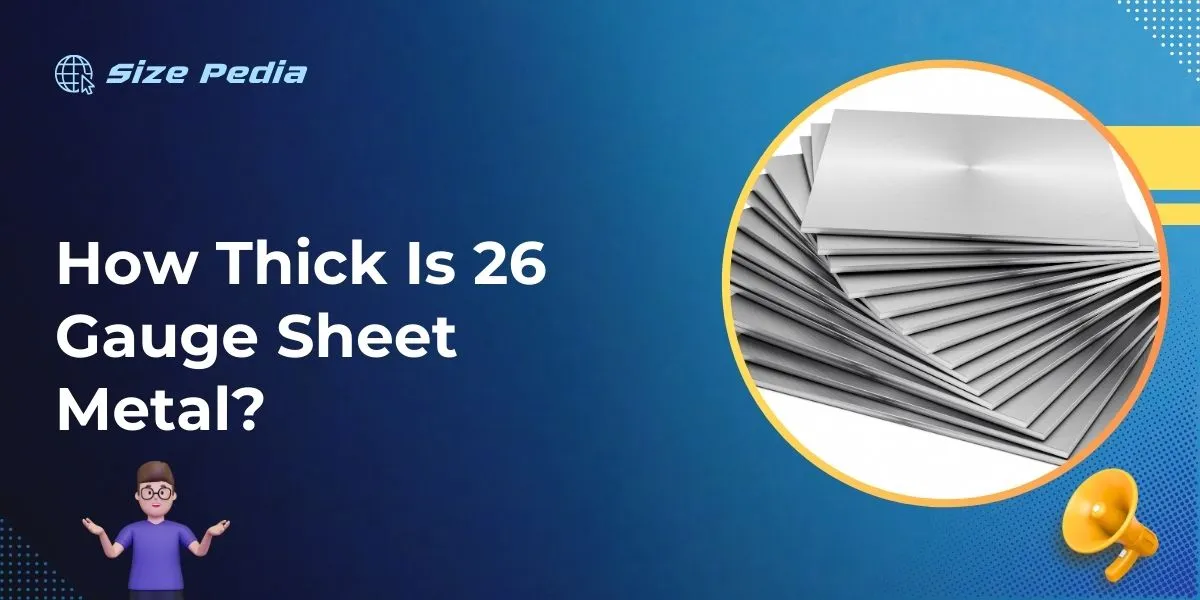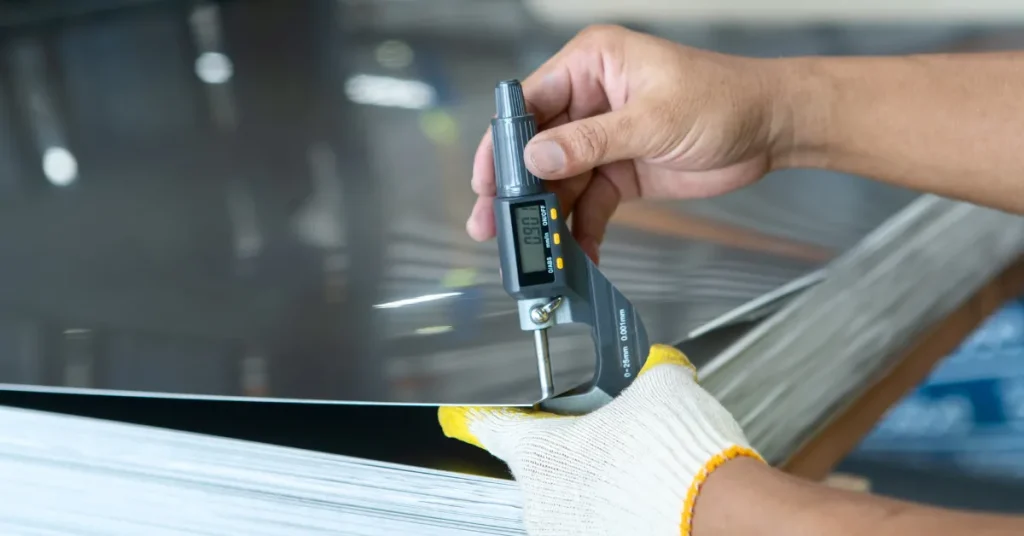26 gauge sheet metal is typically about 0.0159 inches thick, or approximately 0.4 millimeters. This measurement is part of the standard gauging system for sheet metal thickness.
Understanding the thickness of sheet metal is crucial for industries ranging from construction to automotive manufacturing. The gauge system, where a higher number indicates a thinner sheet, can sometimes be counterintuitive.
For those working with metals, knowing the exact thickness associated with gauge numbers is essential to ensure compatibility with different projects and applications.
Selecting the right gauge of sheet metal affects durability, weight, and overall functionality of the final product, making precision in this aspect non-negotiable for professionals and DIY enthusiasts alike.

The Basics Of Sheet Metal Gauges
Understanding sheet metal gauges is essential for builders, hobbyists, and crafters alike. This system measures the thickness of metal sheets, directly influencing weight and flexibility. Knowing how to navigate this system ensures the right selection for any project.
Gauge Numbers Explained
The gauge number system can be perplexing; lower numbers mean thicker metal. Originally based on the number of times a metal had to be passed through a die to be thinned, the gauge number is inversely proportional to the metal’s thickness.
This historical method created a standardized gauge chart, which is crucial in metals work today.
Standard Thickness For 26 Gauge
When we talk about 26 gauge sheet metal, we’re referring to a thickness typically around 0.0179 inches (0.455 millimeters).
Here’s a simple table to visualize this thickness in comparison to other common gauges:
| Gauge Number | Thickness (Inches) | Thickness (Millimeters) |
| 24 | 0.0239 | 0.607 |
| 26 | 0.0179 | 0.455 |
| 28 | 0.0149 | 0.378 |
Keep in mind that different materials might have slightly varied specifications, but 26 gauge sheet metal maintains a consistent presence across the board.
Industry Standards For 26 Gauge Metal
Understanding the industry standards for 26 gauge metal is crucial for both professionals and hobbyists. This gauge, measuring in at 0.0179 inches for standard steel, is commonly used in various applications.
It maintains a delicate balance between flexibility and durability, making it a preferred choice for numerous projects.
Metal Type Variations
26 gauge metal sheets come in different types. Each type has unique properties. The thickness can vary slightly depending on the material. Let’s explore these variations:
- Steel: Standard 26 gauge steel is typically 0.0179 inches.
- Galvanized steel: May be slightly thicker due to added zinc coating.
- Aluminum: Often thinner, around 0.0159 inches for 26 gauge.
- Stainless steel: Has a typical thickness of 0.0187 inches for 26 gauge.
Comparing Different Materials
Different materials used in 26 gauge metal can affect strength and weight. Here’s a comparison:
| Material | Thickness | Strength | Weight |
| Standard Steel | 0.0179 inches | High | Heavier |
| Galvanized Steel | Slightly thicker | High | Heavier |
| Aluminum | 0.0159 inches | Lower | Lighter |
| Stainless Steel | 0.0187 inches | Very high | Heavier |
Measuring 26 Gauge Sheet Metal
Understanding the thickness of 26 gauge sheet metal is crucial. It finds uses in numerous applications, including roofing and ductwork.
The term ‘gauge’ refers to the metal thickness. For 26 gauge, the thickness is typically about 0.0187 inches or 0.47 millimeters.
Tools For Thickness Measurement
Different tools can measure the thickness of sheet metal. Here are some common ones:
- Calipers: Provide precise thickness measurements.
- Micrometers: Offer another layer of precision.
- Gauge measurement tools: These are specifically designed for sheet metal.
Accuracy In Measuring Metal Sheets
To ensure accurate measurements of 26 gauge sheet metal:
- Use the right tool for your measurement needs.
- Check the tool’s calibration before use.
- Take multiple measurements and calculate an average.
Accurate measurements impact the quality and fit of metal sheets in a project.
Applications Of 26 Gauge Sheet Metal

26 gauge sheet metal is a versatile material used in various applications. Its thickness measures about 0.0179 inches or approximately 0.455 millimeters.
Due to its thin profile, it is easy to cut and shape. Let’s look at how this metal fits into different industries.
Common Uses In Construction
Construction relies on 26 gauge sheet metal for durability and ease of use. In buildings, it serves as:
- Roofing materials for its resistance to weather.
- Siding panels that protect against wind and rain.
- Flashing to seal joints against water.
- Ductwork for its airtight qualities.
Versatility In Manufacturing
The manufacturing sector values 26 gauge sheet metal for its flexibility. It is used for:
| Product Type | Reason for Use |
| Automotive panels | Lightweight and forms easily |
| Appliances | Sturdy without adding bulk |
| Electronics | Conducts electricity well |
| Cabinetry | Resilient to wear and tear |
Purchasing Tips For 26 Gauge Metal
Exploring the thickness of 26-gauge sheet metal reveals its versatility in numerous projects, measuring approximately 0. 0159 inches or 0. 40 millimeters.
Before committing to a purchase, assess the metal’s quality and compatibility with your intended application to ensure optimal results.
When buying sheet metal, thickness matters. 26 gauge metal, often used in roofing and HVAC systems, balances durability and malleability. Before heading out to purchase, arm yourself with knowledge to make the best choice for your project.
Quality Assessment Criteria
Assessing quality is crucial. Start with material composition. Make sure the metal comes with certification for its makeup. Check for a consistent thickness across the sheet; unevenness indicates poor quality.
A smooth surface finish is a good sign. Verify if the metal has a protective coating, as it wards off rust and damage. Use a magnet for ferrous metal; non-magnetic types could mean stainless steel or aluminum.
Choosing The Right Supplier
Finding the right supplier is as critical as the metal’s quality. Look for suppliers with positive reviews and excellent customer service. An extensive inventory indicates they can cater to diverse needs.
Customization services show supplier flexibility. Check for after-sales support to handle future issues. Ensure the supplier holds good delivery records; timely projects depend on punctual material delivery.
Consider these tips to ensure you buy the best 26 gauge sheet metal for your task. Always put quality first and choose a reputable supplier to partner with.
Future Of Metal Gauging

In the fascinating realm of metal crafting, gauging sheet metal is key. Understand that 26 gauge metal is quite thin, merely around 0.0187 inches. But the future seems full of promise. Let’s dive into what lies ahead for metal gauging.
Technological Advancements
Technology is changing the way we measure metal. Precise tools now exist, thanks to computers. We have lasers and ultrasonic devices that can gauge metal without touching it.
New apps and software also make the process easier and more accurate. Below are some tech-driven changes:
- 3D scanning for detailed measurements
- Automated systems for consistent quality
- AI algorithms that predict wear and tear
Sustainability In Metal Production
Sustainability shapes the future of metal in big ways. Eco-friendly practices are a must. We are seeing more recycling of metals. The industry is also reducing waste during production. Here’s how:
- Better recycling techniques
- Using less energy to make metals
- Developing new materials that are kinder to our planet
Metal gauging is more than just numbers; it’s about creating a balance. Balance between precision and caring for the Earth. Both technology and sustainability play huge roles in this new chapter.
FAQs About How Thick Is 26 Gauge Sheet Metal
Is 18 Gauge Or 26 Gauge Thicker?
18 gauge is thicker than 26 gauge. The lower the gauge number, the thicker the material.
How Thick Is 24 Gauge Sheet Metal?
24 gauge sheet metal typically has a thickness of approximately 0. 020 inches or 0. 51 millimeters.
How Thick Is 29 Gauge Sheet Metal?
A 29 gauge sheet metal typically measures about 0. 35 millimeters, or 0. 0135 inches in thickness.
How Thick Is 18g Sheet Metal?
An 18-gauge sheet metal typically measures approximately 0. 0478 inches or 1. 214 millimeters in thickness.
Conclusion
Understanding the thickness of 26 gauge sheet metal is crucial for multiple applications. Typically measuring 0. 0159 inches or approximately 0. 4 millimeters, this size balances durability and malleability.
Selecting the correct gauge is essential for your project’s success, ensuring both structural integrity and workability.
Always consult with a professional for the best results in your metalworking endeavors.
Resources:
1. https://www.bls.gov/ooh/construction-and-extraction/sheet-metal-workers.htm
